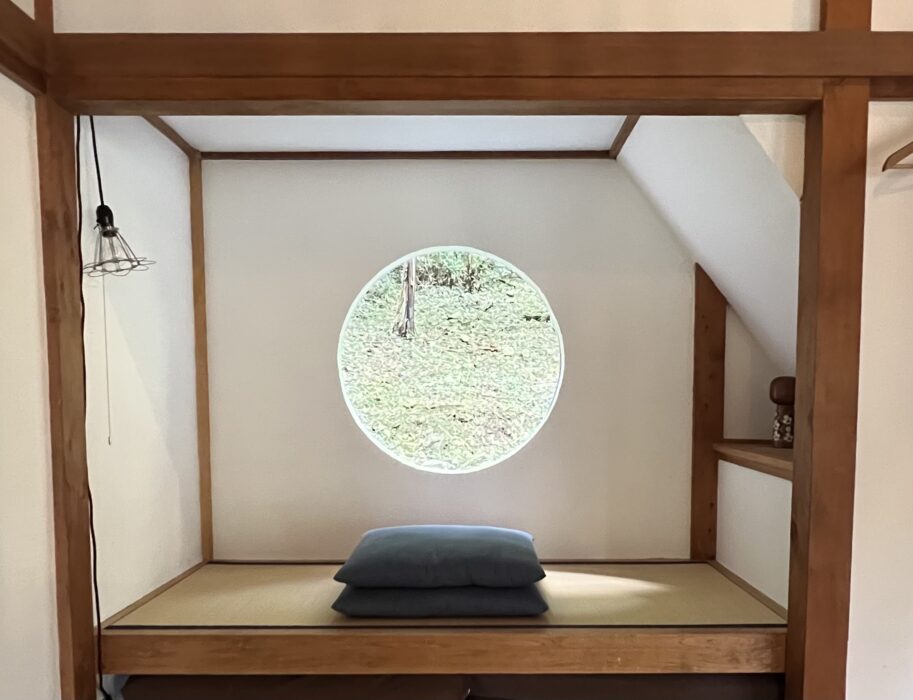Hi! My name is Alice, and I work at Retreat Wabi-Sabi! I wanted to share my experience of this wonderful retreat with all you interested readers. This is just my perspective, but I have found this place to be something special and wanted to give you all a sense of it from a different perspective.
To start, this blog post may be on the Wabi Sabi Shimoda website, but even if it wasn’t, I would recommend you visit Yasuo and Angela’s beautiful sanctuary. All their places are close to the beach, with the main cottages being tucked into the forest, making it feel like you are in a secluded haven deep in the Japanese forest. They also have a homemade swing set up that calls me to sit and gently swing, journal, and listen to the birdsong.
I think my favourite building is Oku. It and Coya are the two smaller cottages, and I particularly love how Oku is behind the others, making it the most private of the cottages. It also has an open concept on the first floor and a cute bedroom on the second floor with indoor windows looking down onto the first floor. My favourite part of it is the reading nook looking out into the forest through a circular window! I could sit there and read all day (if I wasn’t cleaning the place haha).
Their other places, Iriyamaso and Tabi-Tabi, are about a 5-minute walk away from the main buildings. Tabi-Tabi, designed in Japanese indigo with a big kitchen and many rooms, is a wonderful place for a family or large group to spend their time relaxing close to the beach, with easy access to the roads, restaurants, and the rental bikes! I set up the place for a large group that comes every year. They enjoyed the beach and the house and also had barbecues during their visit.
Although all the buildings are designed in a Japanese style with cultural decor, tatami mats, and futons to sleep on, Iriyamaso is the perfect place to really see Kisami as it is. The owners of the building and original hosts of this particular place have retired but still live in the house next door, and the lovely obaachan (grandmother) loves to connect. I loved to see the garden in the morning, chat with the locals, and be more connected to authentic Kisami.
Iriyamaso is a minshuku (a Japanese version of an Auberge in French or Albergue in Spanish). It is a simpler, more budget-friendly place as you book a single room instead of the entire cottage. It also rivals the cottages with its omotenashi (Japanese hospitality) as it is visited daily for a cleaning and a “Hello” either from the hosts or one of the staff.
As one of the housekeepers here, I have learned so much about omotenashi. Angela describes it with an example: if you have been in Japan for even a little while, you may notice that your shoes somehow magically turn themselves around neatly lined up facing the door whenever you go to a Japanese restaurant or stay at a more traditional Japanese ryokan or minshuku. This is a great example of omotenashi. Hosts will turn your shoes around for you and are always thinking about what you need. Omotenashi translates to “no thought.” It is Japanese hospitality at its finest and refers to the mindfulness that makes Japanese culture so caring and aware. They are thinking for you so you don’t have to; they will take into consideration what you will need and provide it for you before you think to ask for it.
In other words, regardless of which place you choose to stay in, the hospitality is fantastic. While I was here, they made a last-minute drive to provide a guest with snorkeling gear after they realized the rental place was going to be closed that day! I hope to learn more about this while I am here and bring it with me to my next experience.
They care so very much about every one of their guests (and workers) and are always happy to share and help you with anything you need. If you want to come to Wabi Sabi, I would recommend having a nice conversation with them both. You will undoubtedly find out something special about this wonderful small town like I have.

